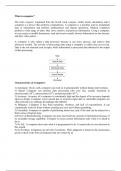What is computer?
The term computer originated from the Greek word compute, which means calculation, and a
computer is a device that performs computations. A computer is a machine used to manipulate
data or information and perform mathematical and logical operations. Modern computers
perform a wide range of tasks: they store, retrieve, and process information. Using a computer,
we can create or modify documents, send and receive emails, browse information on the internet,
and play video games.
A computer is also called a data processor because it can store, process, and retrieve data
whenever needed. The activity of processing data using a computer is called data processing.
Data is the raw material used as input, while information is processed data obtained as the output
of data processing.
Characteristics of Computers
1) Automatic: Given a job, computer can work on it automatically without human interventions.
2) Speed: Computer can perform data processing jobs very fast, usually measured in
microseconds (10-6), nanoseconds (10-9), and picoseconds (10-12).
3) Accuracy: Accuracy of a computer is consistently high and the degree of its accuracy depends
upon its design. Computer errors caused due to incorrect input data or unreliable programs are
often referred to as Garbage-In-Garbage-Out (GIGO).
4) Diligence: Computer is free from monotony, tiredness, and lack of concentration. It can
continuously work for hours without creating any error and without grumbling.
5) Versatility: Computer is capable of performing almost any task, if the task can be reduced to a
finite series of logical steps.
6) Power of Remembering: Computer can store and recall any amount of information because of
its secondary storage capability. It forgets or looses certain information only when it is asked to
do so.
7) No I.Q.: A computer does only what it is programmed to do. It cannot take its own decision in
this regard.
8) No Feelings: Computers are devoid of emotions. Their judgment is based on the instructions
given to them in the form of programs that are written by us.
, Computers in Business
Almost every business you can think of uses computers in one way or another to carry out its
functions. From generating reports to communicating with clients, computers significantly
enhance the efficiency of business operations. Some of the key applications of computers in
business organizations are explained below:
• Communication • Research
• Marketing • Inventory Management
• Accounting • Human resources
• Storage
Communication:
Computers play a vital role in business organizations by maintaining a smooth flow of
information and communication between different parties and stakeholders. Businesses can use
various methods of communication such as email, live chat tools, video or phone conferencing,
social networking, and web conferencing. These tools save time and improve the overall
functioning of the organization. With such advanced tools, it also becomes easier for businesses
to offer timely and efficient customer support to their clients.
Marketing:
Since most marketing is now done online through social media, blogging, website development,
advertising, and e-newsletters, businesses rely heavily on computers for marketing. To make
campaigns more engaging and clear for the audience, IT developers can build websites using a
variety of appealing graphics and content, incorporating different forms of media such as text,
images, and videos.
Accounting:
Computers can also help organizations sort through large amounts of financial data to quickly
determine their financial position, both on a large and small scale, with just a few clicks. They
are also useful for performing various tasks such as invoicing clients, maintaining records of
debtors and creditors, calculating payroll, and preparing and filing tax forms.
Storage:
Businesses can store enormous amounts of data on computers. They no longer need large
cabinets for data storage. With computers and servers, organizations can store and sort billions of
files, making them accessible at any time. Digital storage is not only larger and more efficient
than physical storage, but also more secure. It is much harder to lose or steal files from a well-
protected database, which is one of the main benefits of using computers.




